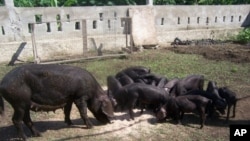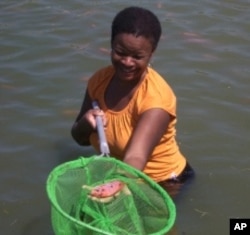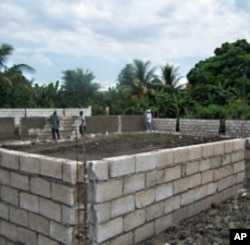A new website makes it easier for the Haitian diaspora in the United States to help fund the reconstruction of their homeland following January's devastating earthquake.
Zafen.org connects projects in Haiti with individual and institutional sources of funding. Zafèn means 'It's our business' in Haitian Creole.
Diaspora dollars
Last year, Haitians living abroad sent more than $1.6 billion back home to family members.
Members of the Haitian diaspora - like Boston physician Arielle Adrien - have also been active in projects which encourage long-term economic growth.
Adrien calls Haiti every day to confer with managers of Kiskeya Aqua Ferme, the organic farm she helps support. Located in the town of Leogane, about 25 kilometers west of Port au Prince, it produces vegetables, eggs, fish, pigs and goats.
Today, she reports with a laugh, "He says you know the fish feeds that we bought just ran out so time to buy a new one. Time to buy a new one. Time to send some more money."
Adrien says supporting an agricultural project long-distance is difficult. Along with the daily phone calls, she visits the farm several times a year.
Thinking big
No one knows how many projects like Kiskeya Aqua Ferma are funded by the Haitian immigrant community.
Liesl Riddle, who runs the Diaspora Program at George Washington University, says it's very hard to quantify.
"You walk in any of these countries and start asking questions about some of the new investments or the new innovations that you see in the business community, and by and large you'll find behind that a diaspora story," she says.
Much of the outside money for Haiti's small entrepreneurs has come in the form of micro-loans from Fonkoze, the nation's largest microfinance institution.
Recently, the diaspora community began expressing interest in funding larger enterprises, which create jobs and offer more opportunities for economic development.
Katleen Felix, Fonkoze's Diaspora Coordinator, explains that Haitian banks don't loan to these mid-size projects, and it's difficult for Haitians living abroad to raise start up costs for these businesses without straining their personal finances.
"Supporting those projects, yes, I would like to put $10,000 in my 401k this year, but I have my community back home that I have to support," she says.
'It's our business'
That's why Fonkoze recently launched Zafen.org.
Haitian businesses approach Fonkoze to make an appeal for funds. The institution's staff reviews each proposal to make sure the business model is sound. Approved projects are listed on the Zafen site, along with a description of the project, and needed funding.
Donors can review the projects and select the ones they want to support. Small contributions are combined and provided as no-interest loans to businesses enterprises.
Fonkoze staff members stay in touch with the entrepreneurs to ensure that the money is being spent appropriately.
George Washington University's Riddle says the process will give the businesses financial credibility as they seek more funding.
"We need some way of being able to certify that certain projects are valid and that money will be used for the purposed they say they're going to use it," she says. "Having a sort of third party identify those projects and put their stamp of approval behind it I think is really critical when we're talking about these type of markets where there aren't these sort of third-party certification institutions."
Arielle Adrien has submitted a proposal to Fonkoze, and looks forward to the day her farming project appears on the Zafen website.
Looking at a photo of her farm's first animal pens, built with concrete blocks, Adrien says, "We have come far, but not far enough."















